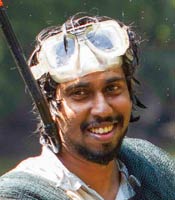Evolution: stories our freshwater fishes tell
View(s):
Rohan Pethiyagoda
Rohan Pethiyagoda and Hiranya Sudasinghe say that they want to give the public a fish’s eye view of conservation from an evolutionary perspective when they deliver this month’s Nations Trust WNPS Monthly Lecture on ‘Evolution: stories our freshwater fishes tell’ on Thursday, September 18 at 6 p.m. at the Jasmine Hall, BMICH.
For the most part, we see nature primarily through the lens of species which, together with landscapes and ecosystems, constitute what we commonly call ‘biodiversity’. We rarely stop to think, however, of the processes that give rise to our astonishing biodiversity. Evolution by natural selection, the most important of these processes, was discovered by Charles Darwin 165 years ago. But despite the passage of so much time, scientists continue to be perplexed by some of the mechanisms by which species evolve.
Taking Sri Lanka’s freshwater fishes as an example, this month’s Nations Trust-WNPS lecture will seek to unravel the evolutionary processes by which this remarkable diversity came to be. The lecture, written in collaboration with Mr. Sudasinghe, will be delivered by Mr. Pethiyagoda.
Aged 33, Mr. Sudasinghe has been exploring freshwater fishes since his childhood. He eschewed a career in medicine to study zoology, securing a first-class in his BSc at Peradeniya and going on to an MPhil in fish systematics. He has discovered and named seven new species and three new genera of fishes, and despite his youth, is the author of more than 30 papers in international journals. He also went on to rediscover two species which were long thought to be extinct. He is presently in the final year of his PhD programme at the University of Bern, Switzerland.

Hiranya Sudasinghe
Mr. Pethiyagoda’s contributions to biodiversity science and conservation have earned him the Linnean Medal for ZoologyRolex Award for Enterprise, and a fellowship of the National Academy of Sciences. He says he has lost count of how many books and papers he has published, among them, The Ecology and Biogeography of Sri Lanka: a Context for Freshwater Fishes (2021), which he co-authored with Mr. Sudasinghe.
“Sri Lanka contains around a hundred species of freshwater fishes,” says Sudasinghe. “Especially in the highlands, fishes have suffered multiple extinction events in the past, most likely due to prolonged droughts. After those extinctions, species that survived in small rainforest refuges in the South dispersed across the country and went on to diversify. Meanwhile other species colonized Sri Lanka via the Palk Isthmus, the land bridge that connected us to India when sea levels were low. Today, DNA analyses show many of these ancestral colonizers evolving into genetically distinct species or incipient species. It is fascinating to watch evolution at work.”
Mr. Pethiyagoda adds that another example of evolution at work is the elongated filaments trailing from the dorsal fin of species of Dawkinsia, a genus he was instrumental in naming after Richard Dawkins, the author of The Selfish Gene, in 2012. “These fish are superb examples of sexual selection, rather like the peacock. But, as we will explain in the lecture, the story is much more complex than that: it is profoundly mysterious.”
Mr. Pethiyagoda says that evolution in Sri Lanka’s freshwater fishes can be useful to understanding evolution even in humans. “It’s uncanny. We are evolving according to principles that were trialled by fish tens of millions ago. The same evolutionary playbook is still in use. Hiranya and I want to share this story with the nature-loving public for the first time. ”
“Hiranya is the first scientist to have shown that mass extinction events have occurred in Sri Lanka,” he adds, “most likely due to climate change. This is a harbinger of what might lie ahead as the planet enters a new spasm of rapidly changing climate. Fish are at very high risk. We want to use this opportunity to explain why it is not just species that we need to preserve, but also the evolutionary processes that give rise to them. It is a different way of looking at conservation.”
“Up to now, we have been thinking about conservation in a really archaic way,” says Mr. Pethiyagoda. “But the fine-scale distribution data we now possess, coupled with genetic analyses, have paved the way for an altogether new approach. We need to think in a finer resolution than just ‘species’. By themselves, Red Lists and protected areas simply will not work. Future generations will not forgive us if we fail to drag conservation into the 21st century, applying the best scientific tools available. We want to use this lecture to outline some of these methods and try to chart the way ahead.”
The lecture is open to the public.
Searching for an ideal partner? Find your soul mate on Hitad.lk, Sri Lanka's favourite marriage proposals page. With Hitad.lk matrimonial advertisements you have access to thousands of ads from potential suitors who are looking for someone just like you.


